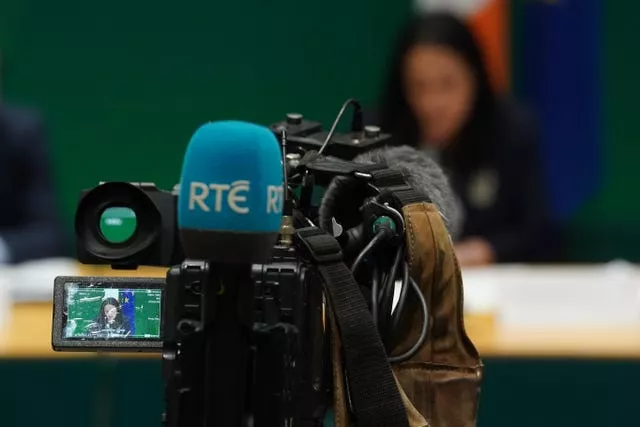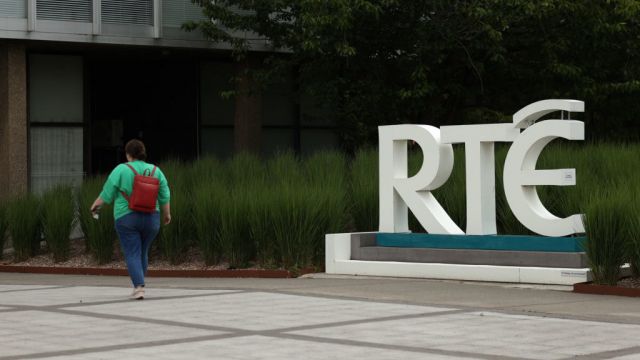The Minister for Media has denied writing a “blank cheque” to RTÉ after signing off on multi-million-euro top-ups to unpredictable licence fee revenues.
The Government has agreed a €725 million funding programme for the national broadcaster over the next three years, in a move described by Catherine Martin as “unprecedented”.
The decision was approved by the Cabinet on Wednesday, after months of wrangling between Ministers about how the broadcaster should be funded.
Under the plan, RTÉ will get €225 million in funding next year from TV licence fee revenue – topped up by direct exchequer funding.

This will rise to €240 million in 2026 and €260 million in 2027.
TV licence sale receipts have been declining for years and amounted to €123 million in 2023.
Under the new plan, Ms Martin said the €225 million in year one would consist of approximately €105 million from traditional TV licence sales and €78 million from “free” TV licences provided through social welfare schemes, while the remainder would come from direct Exchequer funding of €42 million through the Department of Media.
That €42 million is €2 million more than the interim funding provided to RTÉ this year.
Ms Martin would not provide a similar breakdown for 2026 and 2027 as she said she did not know what TV licence revenues would be for those years.

When pressed by reporters on whether this was a “blank cheque” for the organisation, where the exchequer would make up for a long-term trend of declining TV licence revenues, the minister rejected the characterisation.
Ms Martin instead offered an alternative scenario where the money directly provided by the Exchequer could decrease if licence fee payments increase.
At a press conference on Wednesday, she said: “That’s why the essential part of this is strengthening the collection method.”
An Post, which is in charge of collecting the 160-euro annual fee per household, also received €6 million to improve its process.
There have been varying views within Government on whether the TV licence fee should be abolished, with Taoiseach Simon Harris stating that he felt increasing the fee would have been unpalatable to the public.

Ministers had committed to making a decision on a future funding model for RTÉ during this government term after revenues from the TV licence fee fell following a financial and governance crisis at the public-service broadcaster.
In the wake of the scandal, RTÉ director general Kevin Bakhurst committed to reducing its highest earners’ fees, invest in digital and technology, and cut spending this year by €10 million.
The reform plan includes a redundancy programme. Ms Martin refused to provide a figure for how much of the new funding would be used to implement the scheme.
Reacting to the Government’s overall plan, Mr Bakhurst said it would allow the organisation to continue necessary transformation and “restoration of trust”.
He added: “We will not take the opportunity that today’s announcement presents for granted.”

But rival independent network Virgin Media said it was “extremely disappointed” over a lack of recognition of others providing public-service broadcasting.
In a statement, its managing director Aine Ni Chaoindealbhain said RTÉ would be in a more dominant position than ever before and added: “Virgin Media Television has no alternative but to review all options including our position with regards to our existing public-service broadcasting commitments.”
Mr Harris praised the Minister for Media for “settling the question” of RTÉ funding.
Tánaiste Micheál Martin said the “retention and strengthening” of the licence-fee collection system was important because “one never knows when pressure would come on the exchequer” for future direct allocations to RTÉ.
The National Union of Journalists expressed “grave disappointment” over the retention of the current TV licence system but welcomed increased funding for RTÉ.

It further noted that the overall funding figure was €55 million below what RTÉ had sought for the time period.
RTÉ staff are “dismayed and disappointed” that the TV licence was not scrapped, according to their trade union group (TUG).
TUG co-chair Emma O Kelly said: “The Government has chosen to ignore the writing on the wall and stick with a TV licence charge. This is beyond disappointing.”
Elsewhere, a further €22.2 million will be provided for other public-service projects in 2025, including €10 million from the Exchequer for the Media Fund schemes – an increase of €4 million on 2024.







